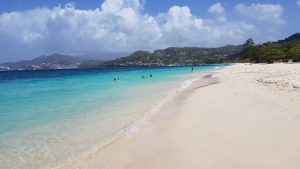
Grenada
I’m going to try and put a positive spin on this: After all I’ve said about not consulting doctors and carrying no pharmaceutical products aboard Samsara, I arrived in Grenada and went straight off to find the health centre.
For most of the 23-day crossing from the Cape Verde Islands, my major preoccupation was whether I was going to lose an arm – and if I did, how I was going to cut it off myself with the aid of the breadknife and a bottle of rum.
…or whether I would chicken out and chuck myself over the side instead.
This was not your average Atlantic crossing.
The 2125 miles between Mindelo and Grenada is supposed to restful – restful to the point of boredom with every day the same – the ship sailing out of a golden dawn and reeling off fifty miles in perfect sunshine before plunging into another spectacular sunset.
To be followed by another fifty miles under starlight so bright that you get a crick in your neck from considering the significance of one little boat when compared to the infinite universe laid out upside down for your inspection.
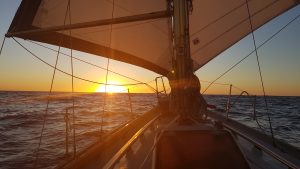
Even so, the prospect of breadknife surgery on the chopping board does claim the attention periodically – like, for instance, every half-hour or so.
All this needs a bit of explanation:
Two days before leaving, I went to buy the beer. I hired one of the lads who hang around the harbour to carry it back for me – there were going to be 72 cans, after all. While in the shop, I brushed my arm against the sharp corner of a shelf. My porter noticed the blood before I did and made me dose it with hand sanitiser (which stung horribly).
I don’t bother about these things too much because I am so stoked up with my food supplement that I very rarely get an infection – and if one should start up, I can see it off by taking a second helping in the evening.
So when, 24 hours into the voyage, the arm showed signs of infection, I took another spoonful of the white powder.
Now, the fact that it was white powder is important: In the six years since I have been ordering this stuff every month, it had always been light brown – an artist might call it light ochre – and tasted horrible. But a monthly order is no good if I keep moving around – particularly in other countries… and especially after the export chaos that is Brexit. So now I buy a year’s supply at a time. This lot arrived in Falmouth. I stowed the cardboard box under the forward berth.
When I opened it in the Canaries, there was clearly something wrong: this powder was white – and tasted of nothing. It might have been baking powder or cornflour. It certainly didn’t seem to be my wonderful supplement.
I emailed the company. They assured me they had sent me the real thing – the difference in colour and taste was something to do with a chance variation in humidity during the freeze-drying process. All the magic ingredients would still be there. I was not to worry.
And so I didn’t – until one day when I was kneeling on deck, working on the toe rail. Suddenly, I felt that unmistakable sensation of sunburn getting started – not in any of the usual places like the shoulders or the top of the head (by this time I was as golden brown as the Ambre Solaire advert). No, this was the soles of my feet – as white as a newborn baby’s – and now, unusually, upturned towards the midday sun..
Without a second thought, I went and fetched the atomiser from its clip above the chart table. In this, I keep a solution of the powder. This really shows you what this stuff can do: just spray it on, and the burning sensation stops immediately. Of course, you don’t go brown either, so I had to ration it on my knees until they matched the rest of me. It even worked when I burned my thumb on the heater. The next morning there was no blister – nothing to see at all.
Yet, a solution made with the white powder had no effect. I might as well have used plain water – the soles of my feet carried on burning. I had to go and find a pair of shoes.
This was a worry – especially as the company was sticking to their explanation. After all, what did I know about it?
Meanwhile, another customer who was taking it on my recommendation wrote asking my advice. I could only pass on what I had been told. But this man did know a thing or two: he had started life as an analytical chemist and he said the humidity explanation was nonsense. He reckoned they’d run out of the usual stuff and substituted something else.
I was sure they would never do a thing like that, but I went back to them – ending up on a Messenger call with the managing director. Once again, he sought to put my mind at rest – although he would exchange my supply for a consignment of the brown version if that was what I wanted.
By this time, I was halfway up the Gambia. I might be stuck there for months waiting for a package from the UK. Clearly, I had no choice but to take the MD at his word.
And so, on January 18th, I set sail for Grenada.
On the 19th, the ship’s log carried the legend: “Bandaged arm”. We had covered just 44 miles. I was still close enough to turn back. It would mean beating into the light trade wind, and I was without a mainsail, having broken the gooseneck on the way to Africa. I would have to rely on the trysail for windward work. In this wind, it might take 36 hours.
Besides, I had a plentiful supply of the supplement, and it had always healed infections before – just take another helping at bedtime. Even if this was a different colour, I would trust the MD – he was the expert, and I couldn’t believe this idea of him substituting something else…
Of course, it would have been better if this had not been a trade wind crossing. Every day was the same – hours of sitting in the sun and discovering that if you can’t be bothered to get dressed in the morning, it doesn’t half cut down on the laundry when you get to the other side. On the other hand, reading a book every 24 hours does leave unusual crease-marks in the new suntan. I suppose nude models don’t sunbathe with their feet braced on the other side of the cockpit because the boat is rolling through 40° every two seconds.
Mind you, I did wake up one night to find us charging along at seven knots, much over-canvassed. Glancing at the plotter on the way out, I was surprised to see we were heading back to Africa – clearly in the grip of a baby hurricane.
They do this: A tiny disturbance kicks up in the gentle easterly airflow, and the next thing you know, a miniature but intense low-pressure system is in action. In the summer months, the higher water temperature feeds it with energy and turns it into a full-blown hurricane which hits the Caribbean chain like an express train, turns sharp right and lays a trail of destruction all the way to the Carolinas.
I took down all sail and lay a-hull for twelve hours. I didn’t see the point in trying to beat into 35 knots when the passage was going to take three weeks anyway.
And it did take my mind off the arm.
The arm was not doing well. Admittedly, natural healing does take longer than a course of antibiotics – all the same, I was used to seeing the inflammation begin to die down after a couple of days. This was just getting worse.
After a week, I had a hole in my arm the size of a pea and every time I changed the dressing, this would erupt with green pus, like an indoor firework.
A week after that, the hole seemed to be closing up – but another one next door to it appeared out of nowhere, producing pus of a greenish-brown hue. Whether this was an improvement, I was not qualified to say.
The First Aid chapter in the almanac had a section on “Open Wounds” (between “fishhook injury” and “bleeding – internal) but the only help from this was that applying a tourniquet was now out of date and risked “loss of the limb”.
Loss of the limb was something I wish they hadn’t brought up. Whatever happened over the coming days or weeks, it was going to be a very private drama. This would not be one of those occasions for mounting an international rescue operation, diverting supertankers and summoning naval vessels equipped with operating theatres – the skipper being ordered to scuttle his yacht before being lifted off.
The log tells me that for 16 days – between day four and day 20 – I saw no other vessels at all – not even on the AIS. So, a Pan-Pan Medico call on my little VHF set with its 15-mile range would have been about as much help as Hornblower’s speaking trumpet.
Also, taking the view that health and safety does not apply over the age of 70, I carry no EPIRB. (If you didn’t know this and find yourself aghast, there is a full explanation of the reasoning behind it in the book – and don’t forget that Alex Honnold climbed the sheer face of El Capitan without ropes or safety equipment of any kind “for the fun of it” – and he was only 32.)
In retrospect, it was all a lot of fuss about nothing because eventually, I sailed into St George’s with all limbs intact and the breadknife only blunted on my attempt at a stoneground loaf with out-of-date yeast.
But I did have unfinished business with the supplement company: as far as I was concerned, here was proof that there was something wrong with the white powder. I started emailing round other customers – specifically those who I knew had to buy it in bulk like me. This has become normal since the chaos that is Brexit. My new-found friend Frank in Lisbon had to wait three months for his first delivery. Now he wrote: “My arthritis is coming back, and in general, it feels like the powder is different. I’ve been taking it for three months now, and the effect is zero. With the brown stuff, I had better joints after a month or so. Now I am back where I was two years ago, despite taking two spoons every day.”
Forwarding this to the MD, I added for good measure that I had been obliged to increase the size of the font on my laptop and the dislocated shoulder from getting falling-down drunk in Tobermory was keeping me awake again – something it hadn’t done for months.
To give him credit, he accepted all of this without question – obviously, people who had taken only the occasional month’s holiday from the brown stuff hadn’t noticed the difference. He would replace our supplies with the right colour. He would get the wrong kind analysed. In future, he would refuse to accept anything but the original formula. All remaining stocks of the suspect powder would be spread on his garden…
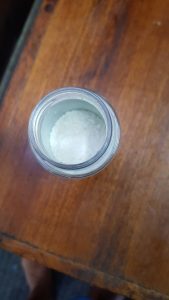
The no-good stuff – almost pure white.
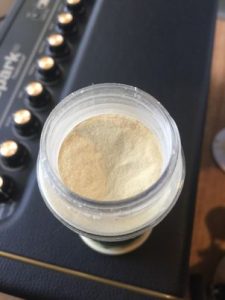
The good stuff – the colour is brown/beige – what an artist would call “light ochre”
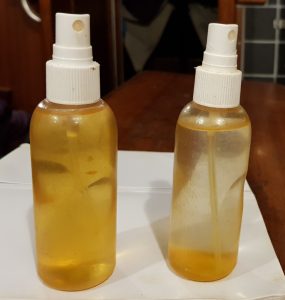
The white “No Good” powder does not dissolve in water – in which case, how can it be absorbed into the body?
So, in the event, there was no harm done – except, of course, to my immune system, which will now have to recover from being knocked askew by a course of antibiotics for the first time since 2016.
And as for the positive spin – well, it does show that the stuff works.
As long as it’s the right stuff…
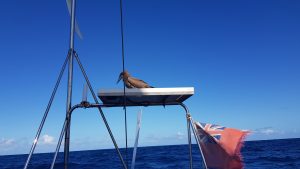
A passenger. This incontinent booby took up residence and refused to get off for 48 hours. Every time I suggested it, he took off, flew a couple of circuits and came back. In the end I gave up.

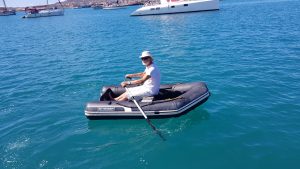
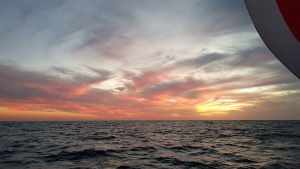





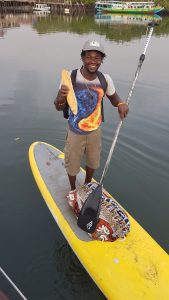

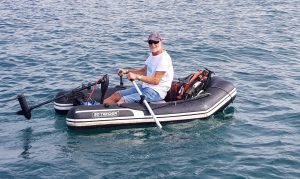

Hello John
Let me say I really enjoyed your booking is excellent.
I am going to ask the same question, where can I get the magic formula? as I too am now getting old and think it might help in my latter years and my wife needs a boost to her immune system.
Thanks for any reply.
Just read your article, very interesting as always, regarding the supplement, for info I’ve just received my order and it is a fawn colour and tastes awful, take care and looking forward to your next episode
Paul
That’s the one!
I know they changed suggested intake and I’m sure it all depends on one’s needs. However do you take a single scoop (gives about 0.8g) when at maintenance level?
A single scoop is only 300mg. That was never enough. The standard adult dose was 600mg. I consider that is OK up to the age of 60. When COVID struck, I was taking 900mg. Since then I have been taking 1,200mg (and haven’t caught it yet…)
Thank god you’re okay! Seems the last I heard you were in the Med. Need to catch up on your travels. Hope to see more on the blog soon.
No, I’ve never been in the Med. I was in the Canaries…
Didn’t the Stones have a song about the brown stuff ?
Hello John
Sorry to hear of your travails. I don’t think that’s quite the mot juste but you’ll get my drift.
Serendipity stumbles on to the stage again – I was minutes away from placing an order for 3 months’ supply when your post landed. Paying in South African Rand for a British product is a painful experience at the best of times, so buying a dodgy powder would move the pain to exquisite level.
I shall hold my order until the mists clear.
Read your book (OMS) with chuckles and enjoyment. Looking forward to Trident.
Stay safe.
Kind regards
Angus
I would say you are safe ordering now. Being in South Africa, you will have to email David anyway and you can ask for his assurance that you will be getting the “light ochre” coloured powder not the white.
Thanks, for sharing your adventure, however adverse. Your reports are inspiring. Glad you are fareing better.
Sounds very unpleasant and must have taken the shine off the crossing. Good copy though . Glad you are on the mend now and hope you can enjoy the rest of the cruise.
John I hope your keeping well. I buy the plant minerals after reading your book in a bulk order I haven’t received any recently since Autumn time last year 2021. all mine are the usual yellow/brown colour it’s brilliant I swear by it as it has been a game changer for both my husband and myself. When I next order I will make sure I mention your problem and check it’s not the white stuff. Thank you for bringing it to our attention. Safe travels and keep safe. Regards Jim and Joyce
Hi John ,
Glad to see you have done your crossing .
Regarding your supplement , I have been taking it for a few months now and no spectacular improvements on my health ! But it is going a bit better .
Anyway , I do remark that I received a monthly one couple of months ago which does not look like the previous one ! It was more whitish !! Instead of a more yellowish !
So , who know ? You talk of a brownish Color ? What do you mean exactly by that ?
Me I would describe it more as a light ocher !
Anyway , take care and wait to read more of your sailing .
Alain
Yes, light ochre is the correct colour
It takes a while to see any changes in your health (this is not like a drug which forces changes on the body). Also, if you had a month on the white powder, that would have slowed things down.
Please let me know what this powder is, I could certainly do with some! A really great story, as usual.
Me thinks I will be placing an order for the Brown stuff JP. Stay as safe as lone sailing permits.
Well that’s interesting John. On your advice and recommendation I ordered this product some time ago, took it for a couple of months or so but noticed zero positive or in fact any effect. It was definitely a white rather than brown powder! It’s probably a bit late in the day to look for recompense or a supply of the proper stuff [I chucked the rest of it out – and cursed you for a knave and a vagabond] and it’s not cheap. Great shame.
Wow! Scary experience. I can only assume you are waiting to discover the efficacy of the usual stuff, being light brown, before disclosing what it is and how to order it. The fact that the formulation had been adulterated does not inspire confidence in the company’s quality control. Are you now taking the “right stuff” and off the antibiotics? How’s your arm?
Awaiting the package of brown stuff. Yes, it does not fill one with confidence in the company (in 2017, they reduced the content from 600mg down to 100mg without telling anyone – the full story of that debacle is in the documents I send to interested parties). On the other hand, it does restore confidence in the brown stuff. What they’ve been playing at, I just don’t know.
Dear John,
I am pleased to hear you have got better. I suspect it was your body that fought off the infection rather than the supplements. Most people on a normal diet do not need supplements and taking too much of some supplements can be harmful. Some alternative medicines from the Far East contain dangerous ingredients – but patients feel better until they get side effects!
Glad you got yourself checked out by a doctor afterwards anyway. Doctors would far rather help at an earlier stage if they can, than at a late stage. We’re here to help, you are not ‘troubling us’
Best wishes,
Monty (Trauma & Orthopaedic Surgeon, with interest in musculoskeletal infection)